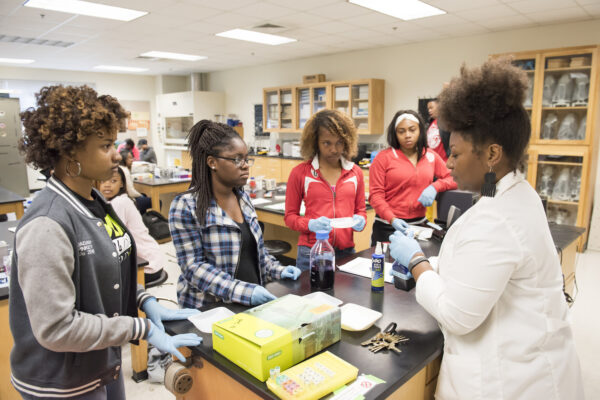More Women Peers Helps Women Succeed in STEM, NBER Finds
Title: Nevertheless She Persisted? Gender Peer Effects in Doctoral STEM Programs
Authors: Valerie K. Bostwick and Bruce A. Weinberg
Source: National Bureau of Economic Research (NBER)
A recent NBER working paper finds that women enrolled in science, technology, engineering, and mathematics (STEM) doctoral programs are more likely to persist and graduate on time when women comprise a greater share of their student peers.
The September 2018 paper by Ohio State University economists Valerie K. Bostwick and Bruce A. Weinberg estimates the effect of cohort gender composition on the persistence and six-year graduation rates of 967 women enrolled in 33 STEM doctoral programs at six public universities in Ohio between fall 2005 and spring 2015.
The authors write that women without women peers in their cohorts are on average 11.9 percentage points less likely than men in their cohorts to graduate within six years. Conversely, their estimates suggest that gender parity in program enrollments would narrow the gender gap in six-year graduation rates to less than a single percentage point by improving women’s outcomes. Bostwick and Weinberg find that these effects are even larger in doctoral programs that are typically dominated by men, such as chemistry, chemical engineering, computer science, electrical engineering, math, and material science.
While the effect of cohort gender composition on women’s persistence and graduation rates is substantial, the precise mechanisms by which it operates remain uncertain. The authors’ findings suggest that nearly all of the women who drop out due to cohort gender composition do so during their first year when students typically undertake coursework, but their estimates suggest that no more than a quarter of this drop out could be explained by poor course performance.
In the absence of other explanations, Bostwick and Weinberg conclude that the peer-gender effects they identify are most likely attributable to the poor climate that women in STEM doctoral programs dominated by men experience during their first semesters of graduate enrollment.
To read the full paper, click here.
—Sam Imlay
If you have any questions or comments about this blog post, please contact us.

